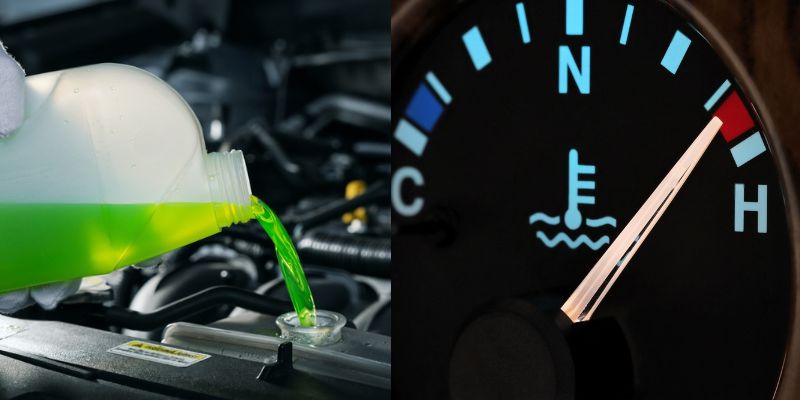The performance and longevity of a car’s engine depend on several factors, and one crucial aspect is maintaining the optimal temperature range.
Extreme temperatures, whether freezing or scorching, can pose significant risks to the engine’s functionality and integrity. This is where antifreeze plays a vital role.
In this article, we will explore at what temperature does a car need antifreeze and find the importance of this coolant in safeguarding the engine from freezing and overheating.
At what temperature does a car need antifreeze?
A car needs antifreeze when temperatures drop below the freezing point of water, which is 32 degrees Fahrenheit (0 degrees Celsius). Antifreeze is necessary to prevent the coolant from freezing, which can cause significant damage to the engine.
The Function and Composition of Antifreeze
Antifreeze, also known as engine coolant, is a liquid substance that serves multiple purposes within a car’s cooling system. Its primary function is to regulate the engine’s operating temperature, ensuring it stays within the optimal range.
It accomplishes this by absorbing excess heat generated by the engine and dissipating it through the radiator.
Typically, antifreeze is a mixture of water and additives. The additives, such as ethylene glycol or propylene glycol, enhance the coolant’s properties, making it more efficient in heat transfer and preventing corrosion within the engine.
Additionally, antifreeze contains inhibitors that help safeguard the cooling system components against rust and scale buildup.
The Impact of Freezing Temperatures on Car Engines
When temperatures drop below freezing, the consequences for a car’s engine can be severe. Water, which is commonly used as a coolant, freezes and expands.
This expansion can cause significant damage to the engine’s components, including the radiator, engine block, and cylinder heads.
Cracked engine blocks and damaged gaskets are common outcomes of freezing coolant, leading to costly repairs or even engine replacement.
The Freezing Point and Antifreeze
To prevent the freezing of coolant, antifreeze is essential. Antifreeze lowers the freezing point of water, allowing the coolant to remain in a liquid state even at very low temperatures.
The specific temperature threshold at which antifreeze becomes necessary varies depending on several factors, including the geographical location and climate.
In regions with harsh winters, where temperatures can dive below freezing, antifreeze is crucial year-round.
However, in milder climates, the need for antifreeze may be more seasonal, primarily during the colder months.
It is important to consult the car’s owner’s manual or seek professional advice to determine the recommended antifreeze concentration for specific temperature conditions and your vehicle.
Overheating and the Boiling Point
While freezing temperatures pose a threat, overheating is another critical concern for car engines.
Excessive heat can lead to engine damage, such as warped cylinder heads, blown gaskets, or even a seized engine. This is where antifreeze, with its ability to raise the boiling point of the coolant, plays a vital role.
Antifreeze increases the boiling point of the coolant, allowing it to withstand higher temperatures without evaporating. This ensures that the engine can operate at optimal temperatures, even under demanding conditions such as heavy loads or extended periods of driving.
Selecting the Right Antifreeze for Your Car
Choosing the correct antifreeze for your car is crucial for optimal engine performance and longevity.
Different car manufacturers may have specific recommendations regarding the type of antifreeze suitable for their vehicles. Consult the owner’s manual or contact the manufacturer to determine the compatible antifreeze options.
There are various types of antifreeze available, including those based on ethylene glycol or propylene glycol.
Each type has its advantages and disadvantages, such as variations in cost, toxicity, and compatibility with different materials. It is essential to understand these differences and select the antifreeze that best suits your car’s requirements.
Proper Antifreeze Maintenance and Care
Maintaining the antifreeze system is crucial for ensuring its effectiveness in protecting your car’s engine.
Regular inspection of the antifreeze levels is important to ensure the coolant concentration is within the recommended range. Low levels of antifreeze can compromise its ability to prevent freezing and overheating.
Flushing and replacing the antifreeze at recommended intervals is essential to remove any contaminants, rust, or scale buildup that may impair the coolant’s performance.
The interval for antifreeze replacement varies depending on the type of antifreeze and the manufacturer’s recommendations. It is advisable to follow these guidelines or seek professional assistance to ensure proper maintenance.
Conclusion
Antifreeze plays a pivotal role in maintaining the optimal temperature range for your car’s engine. Lowering the freezing point and raising the boiling point of the coolant, protects the engine from the dangers of freezing and overheating.
Understanding the temperature threshold at which a car requires antifreeze is crucial for preserving engine functionality and longevity.
To ensure effective engine protection, select the appropriate antifreeze for your car based on manufacturer recommendations.
Regularly monitor antifreeze levels and follow the recommended maintenance intervals for flushing and replacement.
FAQs (Frequently Asked Questions)
Why does a car need antifreeze?
Antifreeze is essential for a car’s engine because it prevents the coolant from freezing in cold temperatures. Freezing coolant can cause severe damage to the engine, including cracked components and costly repairs.
Antifreeze also raises the boiling point of the coolant, helping to prevent overheating in hot conditions.
At what temperature does antifreeze protect the engine?
Antifreeze protects the engine when temperatures drop below the freezing point of water, which is 32 degrees Fahrenheit (0 degrees Celsius).
By lowering the freezing point of the coolant, antifreeze ensures that it remains in a liquid state and prevents damage to the engine caused by freezing.
Can I use water instead of antifreeze in my car’s cooling system?
Using plain water instead of antifreeze in a car’s cooling system is not recommended. While water can help in dissipating heat, it lacks the properties of antifreeze that prevent freezing and offer protection against corrosion.
Antifreeze contains additives that enhance its performance and safeguard the engine, making it a crucial component for optimal engine operation.
How often should I check and replace my car’s antifreeze?
Regularly checking the antifreeze levels in your car is important to ensure proper engine protection. It is recommended to check the coolant levels during routine maintenance or before embarking on long drives.
As for replacement, the interval can vary depending on the type of antifreeze and the manufacturer’s guidelines. It is advisable to consult the owner’s manual or seek professional advice for the specific replacement schedule for your vehicle.
How cold is too cold for coolant?
Coolant is designed to withstand low temperatures and prevent freezing in the engine. The freezing point of coolant depends on its formulation, usually around -34 degrees Fahrenheit (-37 degrees Celsius).
As long as the temperature remains above the freezing point of the coolant in your vehicle, it should not pose any issues.
However, extremely cold temperatures can still impact the overall performance of the engine and other car components. If you live in an area with extremely cold climates, it’s advisable to use a coolant with a lower freezing point or consider adding a higher concentration of antifreeze to the mixture.

Hi, Michael Williams here. I have always loved everything with an engine. After earning my degree in automotive engineering, I spent 5 years testing vehicles for a major manufacturer in Illinois. Now I am using my technical skills to review the latest models online and help others troubleshoot their engine problems with effective solutions.
